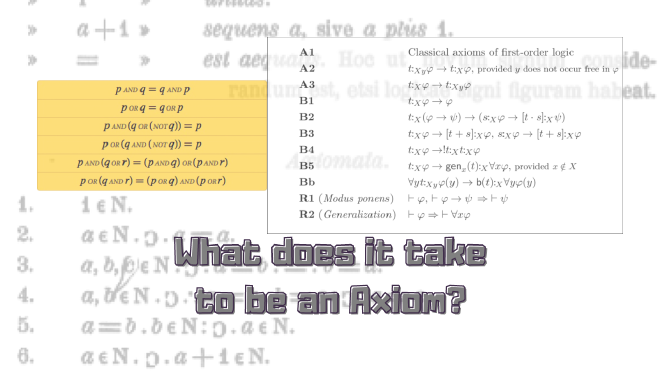Requirements of a Formal System: A Thought

- Every axiom of the system is a tautology.
- Tautologousness is a hereditary property.
- Every formula properly derived from the axioms (i.e, every theorem) is also a tautology.
- Hence every formula that is not a tautology is not a theorem.
- One formula has been found (e.g., ‘pvq’) that is not a tautology.
- This formula is therefore not a theorem.
- But, if the axioms were inconsistent, every formula would be a theorem.
- Therefore, the axioms are consistent.
The above eight points are summarised in Godel’s Proof book. The first requirement that every axiom of the system being a tautology is similar to the theologists claiming the self-evident metaphysical statements of the scriptures. So, every formal system rests upon a tautology. Now we can raise the question, “What factors will give way to tautologousness?” or in other words, “what makes a statement qualify as tautology?”. Again, this is restructuring the question of what makes a set of axioms self-evident in terms of modern logic terminologies. There is a distinction made between tautologousness and consistency of the axioms of a system.
However, if we accept this framework, we only need to ask the question of what to do with a set of axioms? How do we draw inferences and how do we verify its integrity? Write a book on Methods of Proof and try to derive every ounce of insight out of the given formal system. But, that is not the only reason we go to lengths to formalise a system. We formalise the system in the hopes that we have a guideline to tweak it to design our new systems and work further on those. The best example is Euclid’s axioms for planar geometry. Once Riemann proved that the 4th axiom can never be derived from the first three(a worthy exploration), the four mathematical giants, Gauss, Bolyai, Lobachevsky and Riemann himself set out to bring multiverse variations of Euclid’s theory that resulted in elliptical and hyperbolic geometries and such. Today those advanced geometries found a home in Einstein’s Special and General Relativity.
Godel’s Proof raises trouble in a subtle manner, in regards to the possibility of complete formalisation of a logical system like arithmetic, never to be done, only in the light of a bivalent truth theory. If one were to utilise a tetra-lemma truth value as a basis, things might change from current understandings. It is easier said than done. Tetra-lemma is a system used for logical and metaphysical inquiry by Indian Philosophers and also finds its place in Rig Veda Samhita scriptures. However, one interesting thought we can look at is, are every logical system, incapable of being formalised using a bivalent truth theory? If not, what classes of the system fall under this category, and what classes of system fall under the category of proper formalisation under a tetra-lemma system? What does it mean to categorise systems into these categories? Does it throw light on the oneness and duality considerations of these material and spiritual worlds? Is there more to duality and pratibimba than these simple formalisation techniques? Only time and people who work in this direction and put effort can tell us of the possibility.
